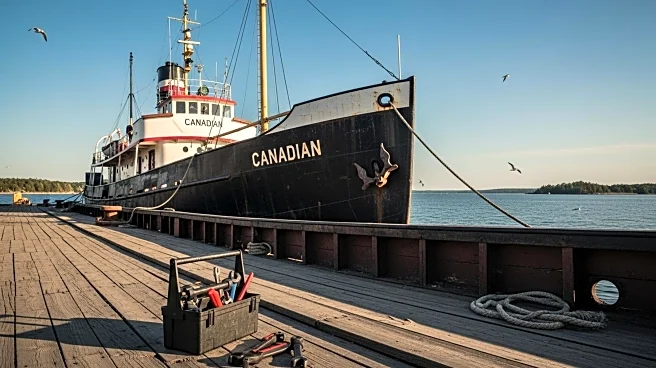What's Happening?
The Transportation Safety Board of Canada (TSB) has released a report detailing the causes of a fire on the Cuyahoga, Canada's oldest vessel operating on the Great Lakes. The fire, which occurred on May 23, 2023, was attributed to fuel leaks and casual repairs on fuel injection pipes. The vessel, built in 1943, experienced a fire in its engine room shortly after departing Marblehead, Ohio, with 11,400 metric tonnes of crushed stone. The crew's attempts to activate the CO2 fire suppression system failed, but the fire extinguished itself after the fuel supply was cut off. The TSB investigation found that the fire was caused by fuel spraying from a disconnected injection line onto hot surfaces, exacerbated by missing retaining clamps.
Why It's Important?
The report highlights significant safety concerns in the maritime industry, particularly regarding maintenance practices and emergency response systems. The Cuyahoga's incident underscores the risks associated with aging vessels and the need for adherence to manufacturer specifications during repairs. The failure of the CO2 fire suppression system due to incorrect activation instructions and missing components raises questions about the reliability of emergency systems on ships. The TSB's findings may prompt industry-wide reviews of maintenance protocols and emergency preparedness, aiming to enhance safety standards and prevent similar incidents.
What's Next?
Following the report, the TSB has initiated a national safety issue investigation to address broader concerns about marine transportation safety in Canada. This investigation will focus on emergency procedures and the use and maintenance of fire suppression systems. The maritime industry may see increased regulatory scrutiny and potential changes in safety standards. Shipping companies might be encouraged to invest in modernizing their fleets and improving crew training to ensure compliance with safety regulations. The findings could lead to policy changes aimed at enhancing the safety of marine operations across Canada.
Beyond the Headlines
The incident raises ethical questions about the responsibility of shipping companies to maintain their vessels and ensure crew safety. The reliance on casual repairs and outdated systems reflects broader challenges in balancing cost-efficiency with safety. The TSB's investigation may lead to cultural shifts within the industry, emphasizing the importance of proactive safety measures and transparency in reporting maintenance issues. The case also highlights the need for international collaboration in addressing maritime safety, as similar issues may affect vessels operating in other regions.









